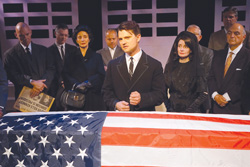
Like most in my generation, the assassination of President John F. Kennedy marked the end of Camelot as well as our innocence in thinking the world was a safe place. After all, other than the drop drills we were required to do in elementary school, the Cold War meant little to us and military wars in general were something we only read about in history books.
Of course within a few years, the Vietnam War would be brought into our homes nightly and young men who could not vote were being shipped off to die for their country. And without the internet to delve behind the scenes, all we knew about the world and politicians was what we saw on television or read in the newspaper.
But in one moment on Nov. 22, 1963, our whole world changed forever, and to this day we still do not know the truth about what actually happened. Was it a conspiracy? But the Warren Commission told us that was not the case. But what if it really was and Kennedy was murdered by those closest to him in his government, just as Julius Caesar had been?
Playwright Daniel Henning started studying the JFK assassination when he was a teenager in an attempt to figure out exactly what had really happened. He shares, “One day I was reading Shakespeare, and then I saw it: the connections to people and situations that directly paralleled those of the JFK story. I noticed some things that made the hair on the back of my neck stand up because it seemed that Shakespeare was not just smart, but in this case almost prescient: he saw the future 350 years before it happened.
That realization led Henning to conceive, adapt and direct the world premiere of THE TRAGEDY OF JFK (as told by Wm. Shakespeare), in which the text of the Bard’s great tragedy Julius Caesar is used to tell the tale of a proposed conspiracy theory in which JFK is seen as the mighty ruler taken down by members of his own government.
And while you may not agree with his examination of the facts, which took him more than 20 years to accumulate, the story told is more than logical with the instigator being J. Edgar Hoover with his vendetta against John F. Kennedy since he wanted to remove Hoover from the office he had held since 1924. But perhaps the most shocking element in his theory is that Vice President Lyndon Johnson was recruited to assist in the plot, and then later passed a law granting Hoover the right to his position for the rest of his life. Henning based his theory on Robert Caro’s amazing work on LBJ in 2012 which confirmed what Henning had gleaned already in his research.
Henning admits “The Tragedy of JFK (as told by Wm. Shakespeare)” answers the question about what he thinks really happened. And it is absolutely amazing that the text of Julius Caesar so perfectly fits into his belief that the assassination was an inside job. One of the most startling scenes to me used the dialogue between Caesar and his wife Calpurnia on the morning he was due to travel to the place of his death. As Jackie Kennedy, Casey McKinnon speaks Calpurnia’s words in which she pleads with her husband not to travel because of her bloody nightmare. And at first, like Caesar, John Kennedy (Ford Austin) agrees to stay home and not go to Dallas… until one of his staff actually convinces him to not buy into her fear and travel as planned to reflect his political ambition. It was spooky and thoroughly parallel in the tragic death of both men.
And then there was Kelie McIver as Kennedy’s secretary Evelyn Lincoln who, like the Soothsayer in Caesar’s story, warns Kennedy about the upcoming danger, but of course no one listens to her. The male conspirators, all introduced at the beginning of the play by the actors playing them, take on the parts of Brutus, Cassius, and the other conspirators with Chad Brannon taking on the role of Robert F. Kennedy speaking as Mark Antony to “Friends, Americans, and Countrymen” at his brother’s funeral. The scene sent chills up my spine, as did the continuing scenes with Robert F. Kennedy running for President in 1968 after LBJ (portrayed by Tim Winters who bears a strong resemblance to him) decided not to run again. I was 18 years old at the time and had met RFK at a rally the day before he was assassinated at the Ambassador Hotel. As I watched the historical film from that night played as the scene unfolded, I remembered how my world seemed to fall apart that night.
Kudos to the entire cast of 17, especially Tom Abatemarco as the wicked J. Edgar Hoover, for their dedication to delivering Shakespeare’s adapted lines so their meaning is crystal clear in Henning’s conspiracy theory on what might have really happened. Like him, I hope this play at least makes you think and talk about the possibilities. And about how to make sure it never happens again, especially during this election year.
“The Tragedy of JFK (as told by Wm. Shakespeare)” continues through Nov. 6 on Fridays at 8:30 p.m., Saturdays at 8 p.m., and Sundays at 2 p.m. at the Starlight Theatre, 1816½ N. Vermont, in Los Angeles (Los Feliz). Tickets are $35 or $25 for students and may be ordered by calling 323-661-9827 or online at www.theblank.com
